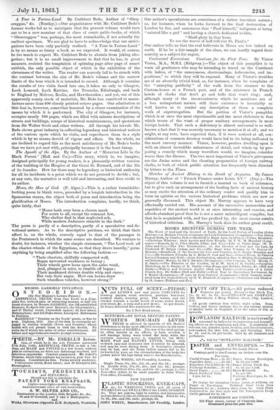Moses, the Man of God. (F. Algar.)-This is a rather
formidable- looking poem in blank verse, preceded by a longish introduction in the Spenserian stanza, the object both of poem and introduction being the glorification of Moses. The introduction complains, hardly, we think, quite fairly, that
"Moses bath ever been a chosen mark For scorn to all, except the remnant few, Who shelter find in that neglected ark, While modern Judaisers stumble in the dark."
'Ile poem is partly of a descriptive, partly of a speculative and de- votional nature. As to the descriptive portions, we think that their effect is, on the whole, scarcely equal to that of the passages in the Pentateuch in which the same scenes are described. We venture to doubt, for instance, whether the simple statement, "The Lord took gff the chariot-wheels of the Egyptians, so that they drove heavily," gains anything by being amplified after the following fashion :- " Their chariots, skilfully compacted well, Began unwonted weakness to betray ; Their wheels grew loose upon the axles weak, And, plunged in mire, to tumble off began ; Their maddened drivers double whip and curse ; But vain their anger. How can horses draw Such wheelless vehicles, however strong !"
Our author's speculations are som.etimes of a rther truculent nature ; as, for instance, when he looks forward to the final destruction of London by fire, and announces that "Paul himself," indignant at being "sainted like a god" and having a church dedicated to him,
"Shall glory in that hour,
To see the waves of hell roll o'er St. Paul's."
Our author tells us that the real believers in Moses are few indeed on earth. If he be a fair sample of the class, we can hardly regard their scarcity as a subject for regret.



































 Previous page
Previous page